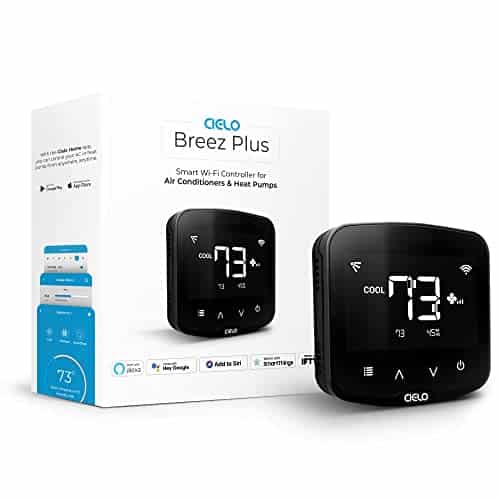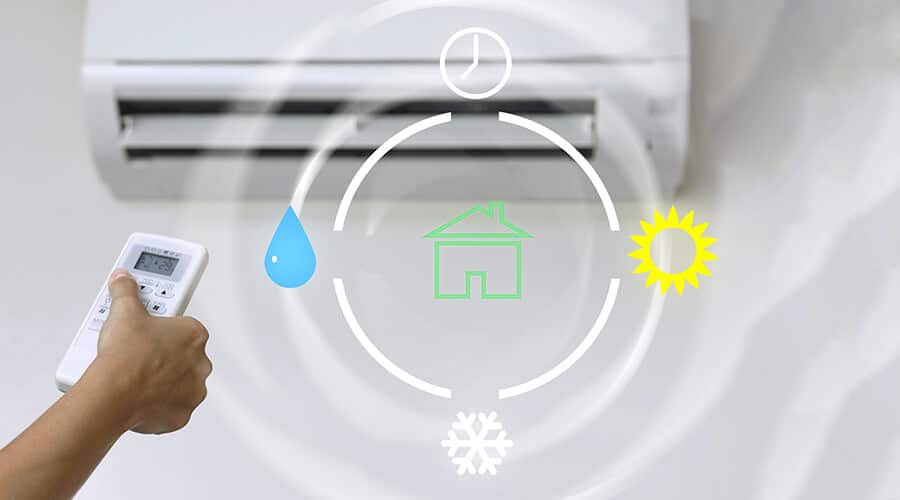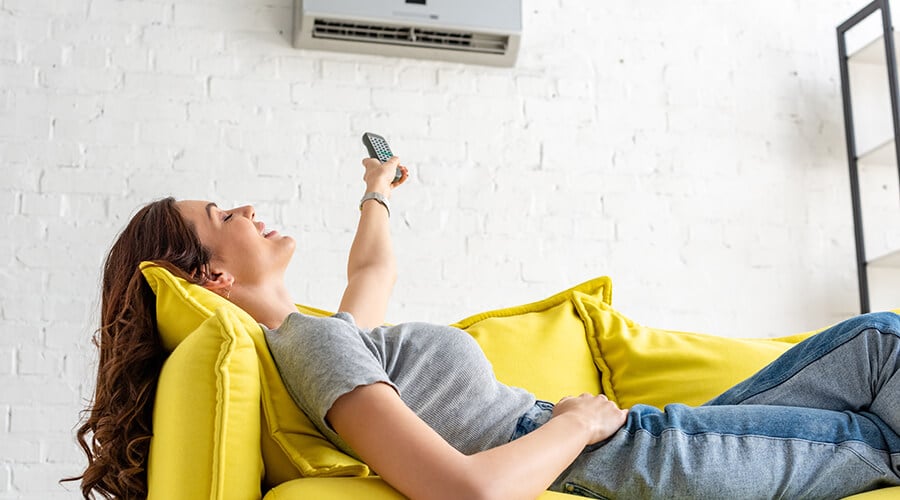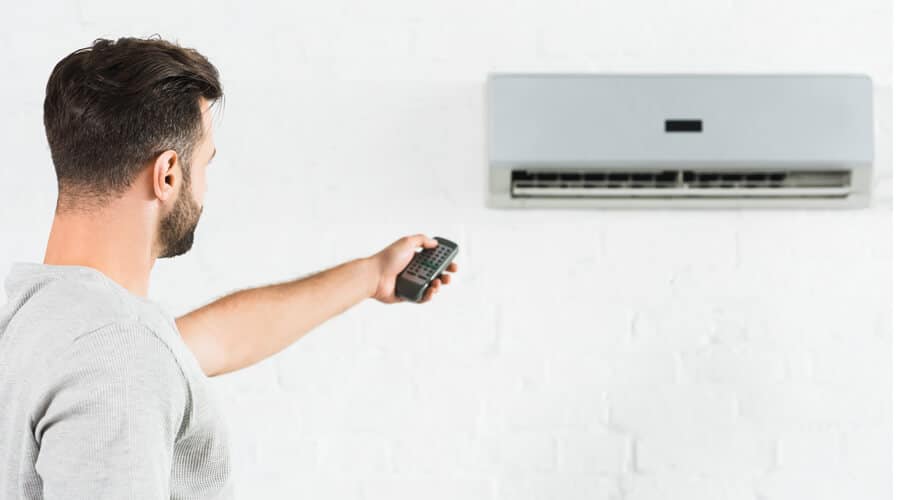Many people turn on their AC units to stay comfortable when the weather starts getting warmer. But running AC under 65 degrees could cost you more money than necessary.
In addition, there are also environmental implications to consider with the amount of energy used as well as potentially damaging your air conditioning unit.
Will running AC under 65 degrees damage it?
No, running an air conditioner in cold weather will not damage it. However, if the temperature outside is below 60 degrees Fahrenheit, the air conditioner will not be as effective at cooling the air inside the home. The same applies for running AC below 60 degrees as well.
The reason for this is that air conditioners rely on warm air to function properly. When the air outside is cold, the unit has to work harder to cool the air inside, which can put stress on the system and can cause it to break down over time.
Additionally, if the unit is not properly insulated, cold air can seep in and cause the coils to freeze, preventing the unit from working altogether.
For these reasons, it is important to take precautions when running an air conditioner in cold weather. In order to prevent damage to your unit, be sure to:
- Use A Smart Air Conditioning Controller
- Set your AC thermostat temperature inside the house at 60 degrees or above
- Make sure the unit is properly insulated
- Have a professional service the unit regularly
what temperature to set air conditioner in winter?
According to the Department of Energy the advice on what temperature to set air conditioner in winter is 68 degrees during the day, and – if you’re comfortable – drop it a few more degrees overnight. This alone could make a big saving of approx. 10% on your annual energy bill.
What are the implications of running an air conditioner in cold weather?
There are both financial and environmental implications to consider when running ac in cold weather. The unit will have to work harder to cool the air, which means it will use more energy and cost more money to run.
Additionally, increased energy use can contribute to pollution and greenhouse gas emissions. If you are concerned about the environment, consider using a more energy-efficient unit or limiting the use of your air conditioner altogether.
How much electricity does an air conditioner use per day?
It’s true that air conditioning (AC) units use more electricity in the home than any other home appliance. But there are ways to limit how much your unit uses without sacrificing comfort. One way is to make sure that your AC unit is running at the right temperature.
The Department of Energy recommends setting your AC at 78 degrees when you’re home during the summer months 68 degrees in winter.
Many domestic air conditioning units are extremely inefficient when used at low temperatures, so it is important to know how to properly use your AC unit.
If you set your AC lower than 65 degrees, your unit will have to work harder to cool your home. Air conditioning (AC) units indeed use more electricity in the home than any other home appliance. But how much do they actually cost to run?
While there is no definitive answer, we can use some rough estimates to get a general idea as well as the SEER rating of the AC unit.
Based on the wattage of common air conditioners and the average cost of electricity in the United States, we can estimate that an air conditioner uses about $0.25 worth of electricity per hour of use.
Therefore, if you use your air conditioner for 8 hours per day, it would cost you about $2 per day, or $60 per month, to run.
However, this is just a rough estimate, and your actual costs may vary depending on the efficiency of your air conditioner, the price of electricity in your area, and how often you use it.
According to the Department of Energy, you can save up to 3% on your cooling costs for each degree you raise the thermostat setting above 65 degrees. They recommend setting your AC at 78 degrees when you are at home.
So, turning your AC off or raising the temperature a few degrees when it’s not too hot outside could save you some money.
What is Smart Air Conditioning Control?

Smart Air Conditioning Control is a technology that allows air conditioners to run more efficiently and save energy.
By using sensors to detect and respond to changes in the environment, Smart Air Conditioning Control can make adjustments to the cooling process to maintain the desired temperature. This results in reduced energy use and improved comfort.
Smart AC controllers like the Cielo Breez Plus Smart Air Conditioner Controller work with mini split, portable, and window AC units that have an infrared (IR) remote control.
It connects to your Wi-Fi router, enabling control through a smartphone, Amazon Alexa, or Google Home. The product comes with all necessary accessories, including a wall plate and a free table stand.
Key features include the ability to set up weekly schedules, configure location-based controls for automated operation, and energy savings of up to 25%. The Cielo apps provide a complete timeline of air conditioning actions, allowing you to track usage from anywhere.
A unique feature is the option to control the device locally, without Wi-Fi, after initial registration. This includes power on/off, fan speed, swing position, and mode selection. Alternatively, you can keep the device connected to Wi-Fi for remote control from anywhere.
Other types of smart thermostats can detect when you are in your house by detecting movement and body heat. They can also be set to automatically adjust the temperature based on the time of day or the outside temperature.
This allows your air conditioner to run more efficiently and reduces energy waste.
Smart AC controllers are available as standalone devices or as part of a smart home system. If you are interested in saving energy and money, consider investing in a Smart Air Conditioning Control System for your home.

What are the benefits of Smart Air Conditioning Control?
There are many benefits to using Smart Air Conditioning Control, including:
Improved comfort: By responding to changes in the environment, Smart AC can maintain a more consistent temperature, resulting in improved comfort.
Remote connectivity: Many units come with connectivity features to allow you to connect to services like Amazon Alexa, Google Home or Apple’s HomeKit. Amazon also offers a Smart Home connection service for Alexa devices.
Energy savings: Smart AC can save you money by reducing energy waste and running more efficiently.
Convenience: Smart AC can make your life easier by automating the cooling process and eliminating the need to adjust the temperature manually.
Improved air quality: By controlling the humidity in your home, Smart Air Conditioning Control can improve the air quality in your home.
Environmentally friendly: Smart AC can help you save energy, which reduces pollution and greenhouse gas emissions.
What are the disadvantages of Smart Air Conditioning Control?
There are a few potential disadvantages to using Smart Air Conditioning Control, including:
Cost: Smart AC systems can be more expensive than traditional AC units. So it’s important to choose a system that fits your budget.
Complexity: Smart AC systems can be complex, and you may need to hire a professional to install or repair them.
Privacy concerns: Some people may be concerned about the amount of data that Smart AC systems collect.
Dependency on electricity: If there is a power outage, your Smart AC system will not work unless it has a battery backup.
Limited compatibility: Not all AC units are compatible with Smart AC systems.
How much does Smart Air Conditioning Control cost?
The cost of Smart Air Conditioning Control depends on the type of system you choose. Standalone devices can cost anywhere from $100 to $500, while whole-house systems can cost $500 to $3000.

What are the different types of Smart Air Conditioning Control?
There are two main types of Smart Air Conditioning Control:
Stand-alone devices: These are standalone units that can be controlled with a smartphone or tablet.
Whole-house systems: These are systems that work with your existing AC unit to provide smarter cooling.
Make sure the system you choose has the features you need, such as the ability to control multiple AC units, automatic temperature adjustments, and humidity control.
What does eco mean on an air conditioner?
The term “eco” on an air conditioner refers to the energy efficiency of the unit. Air conditioners use a lot of energy to cool a home, so an eco-friendly AC unit will use less energy to do the same job. Consider using a portable air conditioning unit to cool only the room you use most.
This can save money on your energy bill and help to reduce your carbon footprint. There are a few different ways that air conditioners can be more energy efficient.
Some units have sensors that adjust the cooling depending on how many people are in the room. Others use environmentally friendly refrigerants that don’t damage the ozone layer. And some units are simply designed to be more efficient, using less energy to cool your home.
When you’re shopping for an air conditioner, look for the eco-label to find the most energy-efficient units.
Whats the lowest I can set my AC?
Most air conditioners have a minimum setting of 60 degrees Fahrenheit. However, some models allow you to set the temperature lower than this. If you want to set your air conditioner to a temperature lower than 60 degrees, it’s important to consult your owner’s manual. Otherwise, you risk damaging the unit.
Additionally, keep in mind that setting your air conditioner too low can actually make your home feel cooler than it would if the unit were turned off completely. This is because cool air circulates more quickly than warm air.
So, if you’re looking for a way to cool your home quickly, setting your air conditioner to its lowest setting may not be the most effective option.
What is the best AC temperature to sleep?
The best AC temperature to sleep varies depending on individual preferences. Some people find it easy to fall asleep in a cool room, while others prefer a warmer environment.
However, most experts agree that the ideal temperature for sleeping is between 60 and 67 degrees Fahrenheit.
This range promotes deep sleep and helps to prevent night sweats. In addition, adjusting the AC to these cooler temperatures can also help to save on energy costs.
So if you’re looking for the perfect balance of comfort and efficiency, setting your AC to 60-67 degrees Fahrenheit is the way to go.
Why does my air conditioner keep running after it has reached the set temperature?
One reason your air conditioner may keep running after it has reached the set temperature is that the thermostat is not working properly. If the thermostat is not calibrated correctly, it may think the room is warmer than it actually is and will continue to run the AC.
Another possibility is that there is a problem with the AC unit itself. The compressor may be damaged or the Freon levels may be low, causing the AC to run longer in order to cool the room.
If you suspect that your AC unit is not working properly, it is best to call a technician for a diagnosis and repair. With a little troubleshooting, you can soon enjoy cool, comfortable air in your home once again.
Should air conditioners be covered during the winter?
As the weather begins to cool off, many homeowners start to prepare their homes for winter. One common task is to cover up or otherwise protect outdoor AC units with an air conditioning unit cover. However, there is debate over whether this is actually necessary.
Some experts argue that it can help to prevent ice and snow buildup, which can damage the unit.
Others contend that most modern air conditioners are built to withstand the elements and that covering them is simply an extra step that isn’t necessary.
Ultimately, the decision of whether or not to cover an air conditioner during the winter months is up to the homeowner. However, it is important to consult with the manufacturer’s instructions before taking any action.
Conclusion
While some people may find running the AC under 65 degrees comfortable during winter, it’s actually costing you more money in the long run.
Running an air conditioner in cold weather will not damage the unit, but it is not as effective. There are also environmental implications to consider.
Be sure to take precautions if you decide to use your unit in cold weather or set it to the Department of Energy’s recommended temperature of 68 degrees.
Keep your home at a comfortable temperature but be aware you can save yourself some money by adjusting the temperature a few degrees during the winter months.



